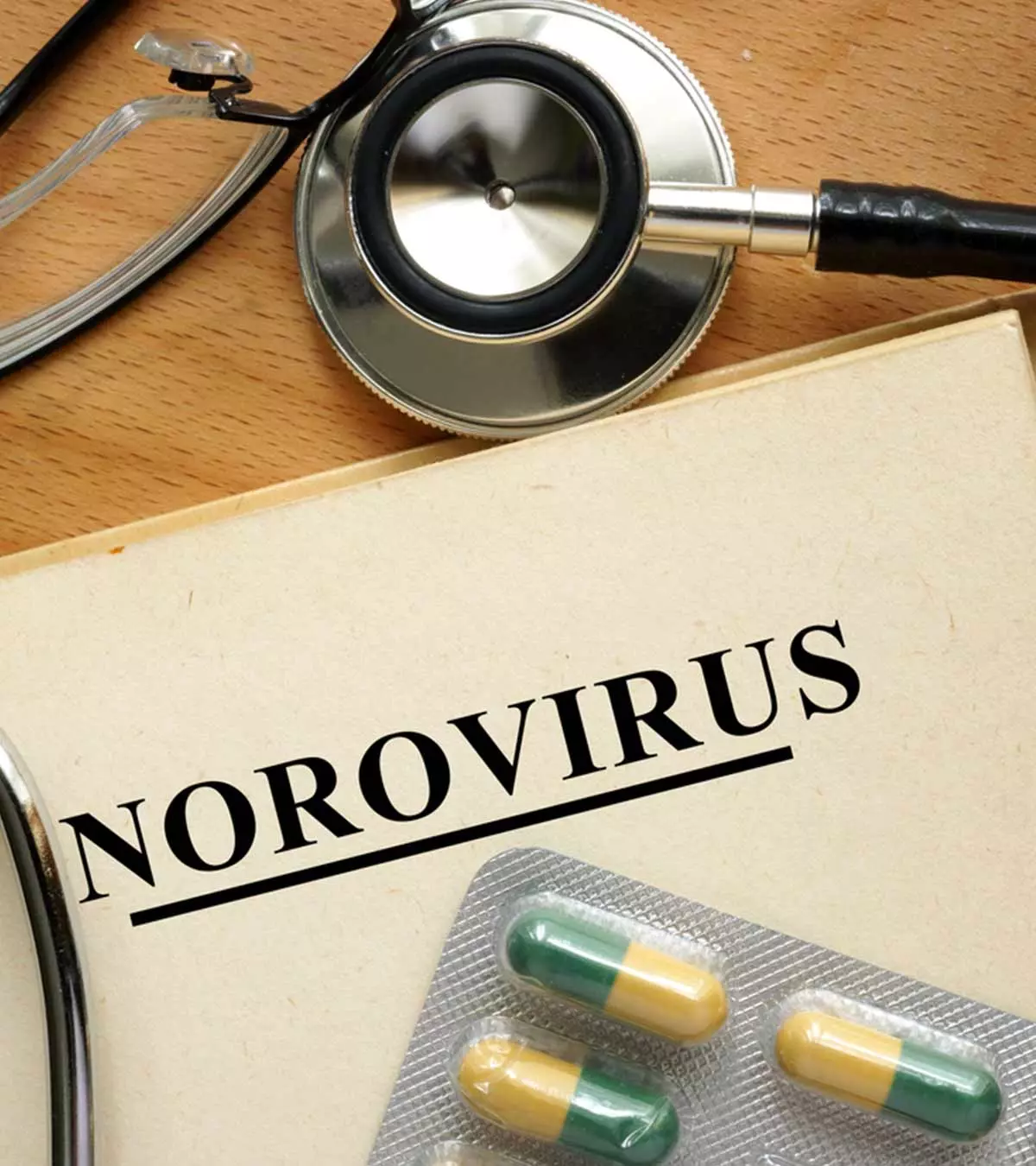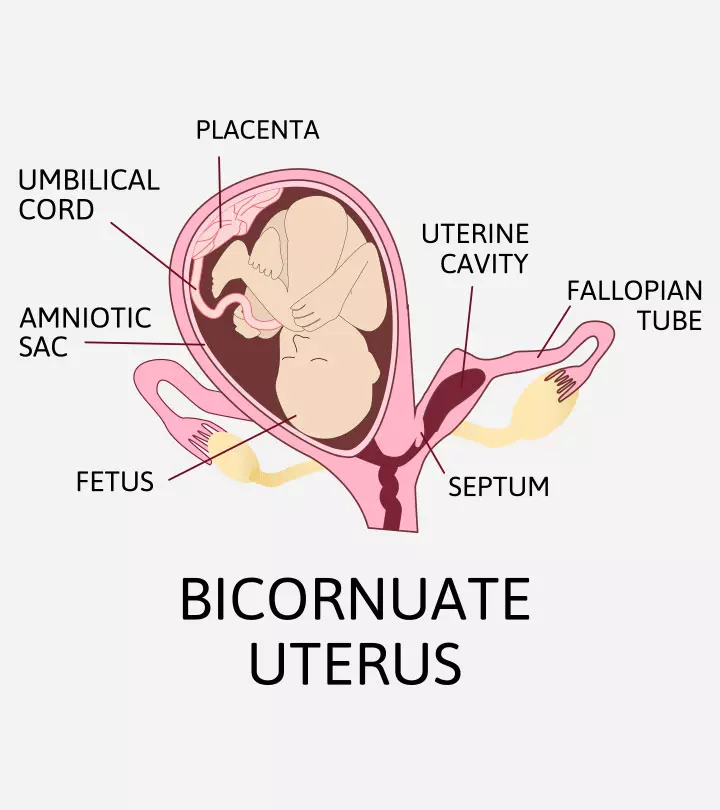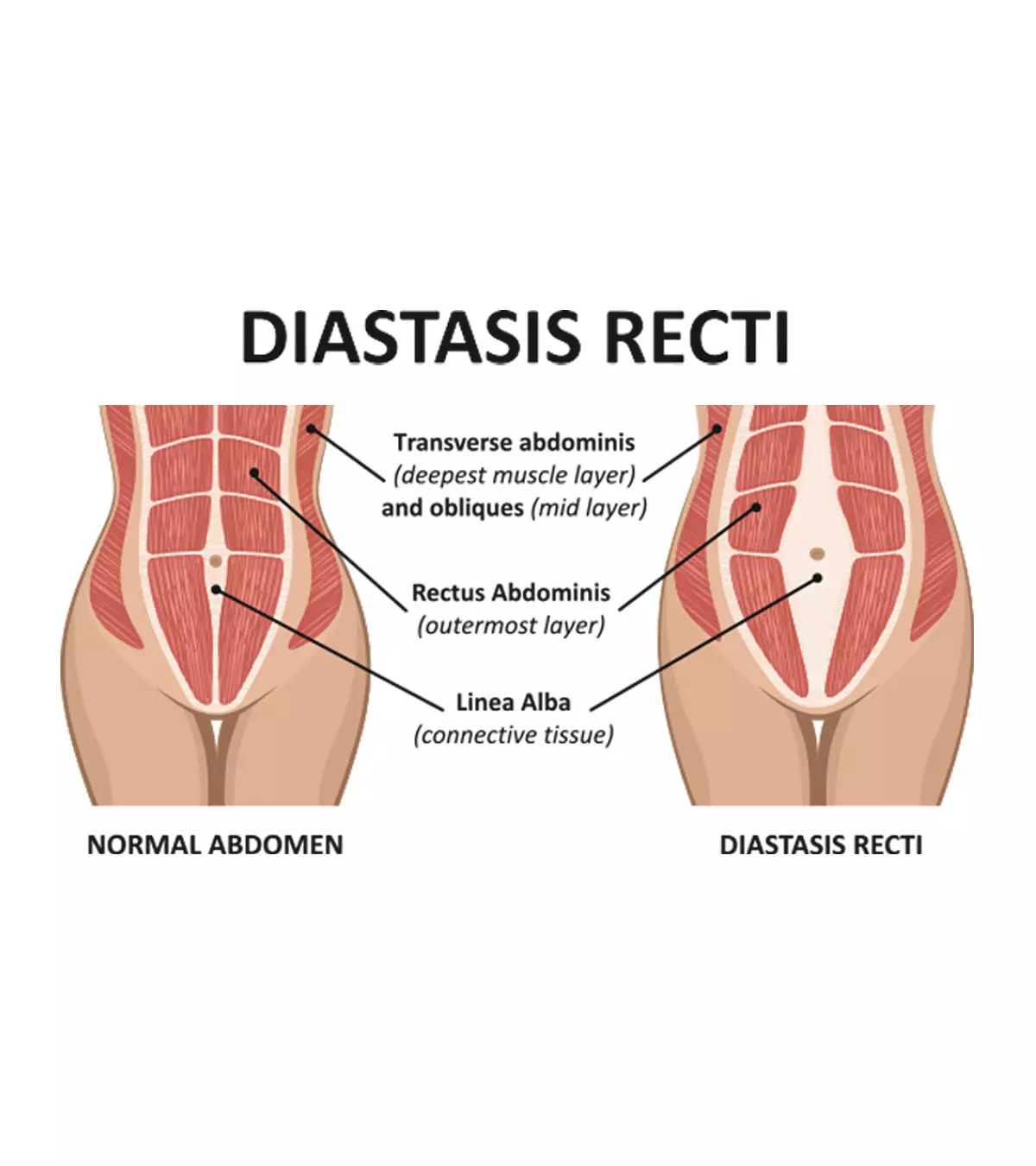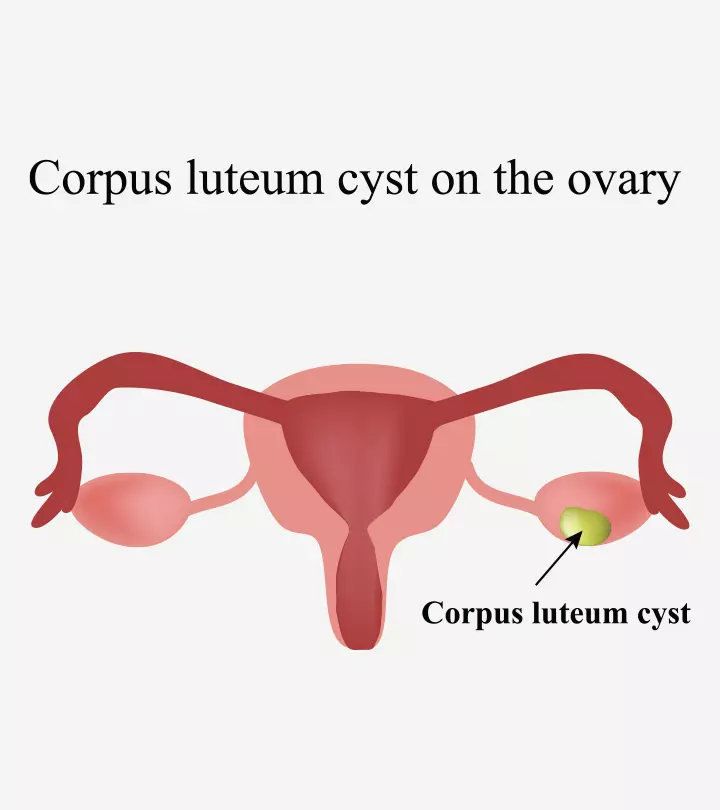
Image: ShutterStock
Corpus luteum cystsiFluid-filled, benign growths that form on or under the skin during pregnancy are common ovarian cysts formed when the corpus luteum (cluster of cells in which the egg seals itself) fails to shrink after about 12 weeks of pregnancy, causing it to fill with fluid. The corpus luteum produces progesteroneiA female reproductive hormone that plays an important role in menstruation, pregnancy, and breastfeeding that helps prepare the endometrial lining for implantation. These cysts are common during pregnancy and not usually troublesome. But, if these are not treated immediately, they might continue to grow, rupture and twist, giving rise to pregnancy complications (1) (2) (3).
Read on to know about the symptoms, causes, and treatments for corpus luteum cyst in pregnancy.
Key Pointers
- Corpus luteal cysts are harmless when they turn into a luteal cyst as they can produce progesterone.
- Transvaginal and transabdominal ultrasounds can help detect corpus luteum cyst size, shape, and location.
- Ovarian cyst symptoms include pelvic pain during period, pain during intercourse, unusual swelling or bloating of the abdomen, etc.
Are Corpus Luteum Cysts Normal In Pregnancy?
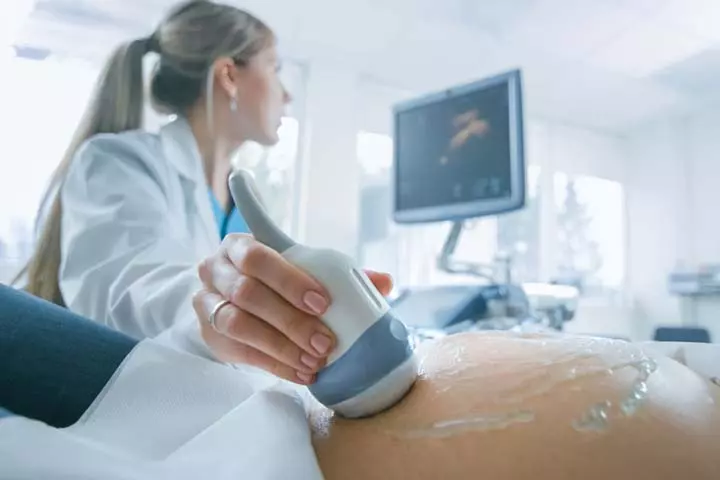
Image: Shutterstock
Corpus luteal cysts are among the most common functional ovarian cysts during pregnancy. When the corpus luteum cyst develops into a luteal cyst, it continues to produce progesterone to support the pregnancy and is mostly harmless. The cyst gradually disappears at the start of the second trimester.
If the corpus luteum cyst persists for a long time, your doctor may recommend regular ultrasounds to monitor the cyst and observe if any signs of cyst rupture or torsion exist (1) (4).
 Quick fact
Quick factCorpus Luteum And The Menstrual Cycle
The corpus luteum releases progesterone and plays an integral part in the menstrual cycle, which proceeds in three distinct phases (5) (6):
- Follicular phase: The follicular phase begins on the first day of the menstrual period and continues for around 14 days. During this phase, the pituitary gland secretes a high level of follicle-stimulating hormoneiA hormone responsible for male and female sexual development and reproduction (FSH) and luteinizing hormoneiA hormone responsible for male and female sexual development and functioning (LH) into the blood supply, inducing the maturation of the follicles containing eggs.
One of the follicles, known as the dominant follicle, grows faster than the others and causes an increase in estrogeniA sex hormone responsible for the development of female sexual characteristics levels by day seven. The estrogen then suppresses the level of FSH and increases that of LH, thereby marking the beginning of the ovulatory phase.
- Ovulatory phase: The ovulation phase occurs on day 13 or 14 of the menstrual period. As the level of LH in the blood increases, the egg in the dominant follicle completely matures and releases. The follicle then contracts into a cluster of cells called the corpus luteum, marking the beginning of the luteal phase.
- Luteal phase: This phase usually begins on day 15 with the corpus luteum producing an increased level of progesterone. It induces the development of the uterus’s endometrium lining to implant the sperm-fertilized egg and helps sustain the pregnancy.
The corpus luteum produces progesterone up to ten weeks of pregnancy, after which it shrinks and eventually disappears.
If pregnancy does not occur, the progesterone and estrogen levels gradually decrease, causing the endometrium lining to fall off, which induces menstrual bleeding.
Symptoms Of Corpus Luteum Cysts

Image: Shutterstock
Functional ovarian cysts, such as corpus luteal cysts, generally do not present symptoms and can disappear without treatment. However, when ovarian cyst symptoms manifest, they could include (3) (7)
- Constant pelvic pain or pain before and at the beginning of a period
- Pain during intercourse
- Unusual bloating or swelling of the abdomen
- Unexplained weight gain
- Abnormal vaginal bleeding and heightened menstrual cramps
- Difficulty or pain during urination and bowel movements
- Frequent urination
 Be watchful
Be watchfulIdentifying Corpus Luteum Cysts
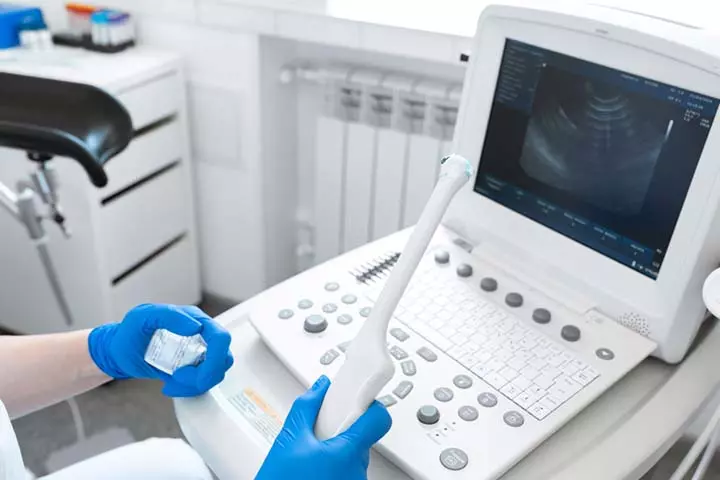
Image: Shutterstock
A corpus luteum cyst is usually detected through a transvaginal ultrasound using a transducer. When placed in the vagina, the transducer produces sound waves that help visualize the ovary and the cysts, if any. In addition, a transvaginal ultrasound enables the doctors to identify the cyst’s location, size, and shape and determine if it is fluid-filled or solid (8).
This cyst can also be detected through a transabdominal ultrasound, where the transducer is placed on the abdomen to visualize the cyst (9).
Risk Factors Of Corpus Luteum Cyst
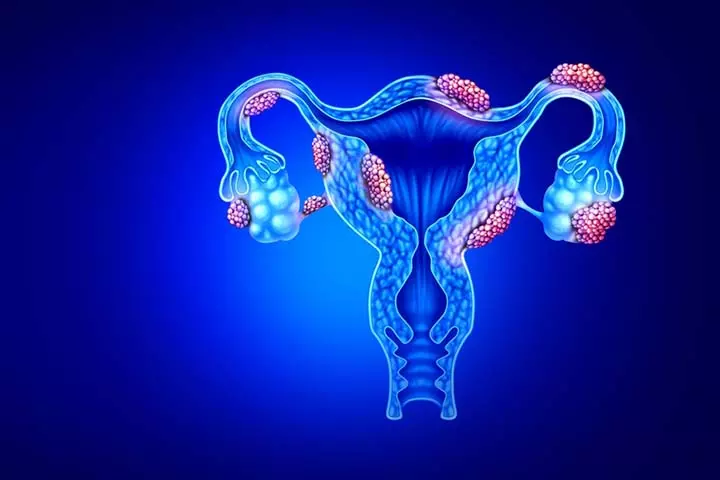
Image: Shutterstock
While corpus luteum cysts are a common occurrence and can appear irrespective of additional influences, certain risk factors can increase the possibility of their appearance in some women (9) (10)
- Fertility medications: The most commonly prescribed fertility drug is clomiphene, given to women facing difficulty in conceiving or women with PCOSiA hormonal condition in females characterized by irregular periods, cysts on the ovaries, weight gain, and excess body hair . PCOS interferes with the production of the pregnancy hormones that release the eggs from the follicles. These medications could create a hormonal imbalance resulting in an ovarian cyst.
- Endometriosis: As stated by the World Health Organization, Endometriosis affects roughly 10% (190 million) of reproductive-age women and girls worldwide. This condition causes the tissue lining the uterus to grow on its outside. Women with endometriosis are at a higher risk of developing a corpus luteal cyst.
- Pregnancy: Pregnant women may be at greater risk of the cyst; however, a corpus luteum cyst can also develop in nonpregnant women.
- Ectopic pregnancy: The condition where the egg implants outside of the uterus, either in the fallopian tubesiMuscular, hollow ducts connecting the uterus with the ovaries to transport eggs during ovulation or the ovary. The probability of developing a corpus luteum cyst may be higher in women with ectopic pregnancy.
When To Seek Emergency Care
Corpus luteum cysts generally do not require any medical attention and disappear over time. However, if you experience acute abdominal pain, abnormal bleeding, and high temperature, check with your healthcare provider as these could be symptoms of an ovarian cyst rupture or a torsion (7).
Treatment For Corpus Luteum Cyst
Seek medical treatment in case of extreme symptoms and complications. The treatment may be as follows (3) (7).
- Observation: For mild symptoms that do not cause any discomfort, your healthcare practitioner may recommend regular observation through routine ultrasounds and physical examination until the symptoms subside.
- Oral contraceptives: Birth control pills may be prescribed, which can help prevent the risk of recurrence of the ovarian cyst. Your healthcare practitioner may also prescribe pain relief medication.
- Laparoscopy: In severe pain or ovarian cyst rupture or torsion, laparoscopic surgery may be recommended. In this surgery, a tube fitted camera, inserted through a small cut in the lower abdomen, is used to visualize and remove the cyst.
Corpus Luteum Cyst Rupture During Pregnancy
Cysts can sometimes rupture and cause acute pain in the lower abdomen. The doctor may prescribe certain pain relief medications, following which the cyst usually heals.
A ruptured cyst can sometimes lead to hemoperitoneum, a condition characterized by a blood-filled peritoneal cavityiThe space between the inner lining of the abdomen and the outer layer of the abdominal organs . The condition generally requires a laparoscopic or laparotomyiA surgical incision into the abdomen to diagnose any problems surgery based on its severity (10) (11).
Corpus Luteum Cyst Torsion During Pregnancy
A growing corpus luteum cyst may add weight to the ovary, causing it to twist on itself or the surrounding tissues. When an ovarian torsion occurs, the blood supply to the ovary is obstructed causing severe pain and sometimes vomiting and may require immediate surgery (12).
Frequently Asked Questions
1. Can a corpus luteum cyst cause miscarriage?
Typically, a corpus luteum cyst does not interfere with the pregnancy but helps sustain it by producing the progesterone hormone and disappears by the second trimester. However, a corpus luteum cyst can become hemorrhagic, where blood fills the cyst cavity, causing acute abdominal pain. Seeking medical attention helps prevent the risk of miscarriage (13).
2. Can a corpus luteum cyst be cancerous?
A corpus luteum cyst, being a functional cyst, is usually not cancerous. However, some conditions associated with corpus luteum cysts, such as endometriosis and PCOS, are associated with an increased risk of developing ovarian cancer. Further, ovarian cancer can sometimes show as a luteal cyst. Your doctor may conduct different tests based on the cyst’s size and symptoms to identify any chance of malignancy (14) (15).
3. Can a corpus luteum cyst cause a positive pregnancy test?
Pregnancy can cause corpus luteum cysts. However, a corpus luteum cyst can sometimes give a false positive pregnancy result due to increased hCG levels. Your healthcare practitioner may perform additional tests, such as pelvic examination, ultrasound, and blood tests, to confirm the results (16) (17).
4. What does the corpus luteum look like on an ultrasound?
A corpus luteum is a thick-walled cyst having a typical ‘ring of fire’ peripheral vascularity on color Doppler ultrasound. It is usually seen with a crenulated (ridge-like) inner margin (18).
5. Can a corpus luteum cyst be mistaken for a gestational sac?
The corpus luteum may be confused with the ectopic pregnancy’s gestational sac. However, a reliable way of distinguishing it from ectopic pregnancy is by identifying the location of the lesion. Corpus luteum arises from the ovary, while most ectopic pregnancies are tubal (19).
6. What are the long-term effects of corpus luteum cysts on fertility?
Luteum cysts typically do not have long-term effects on fertility, as they are often self-resolving. However, persistent cysts or those linked to conditions like PCOS may need frequent monitoring.
Corpus luteum cysts in pregnancy are common and generally dissolve over time. However, if you experience symptoms such as severe abdominal pain, high fever, or bleeding, consult your doctor to avoid any complications. When detected early, the symptoms can be treated easily with the help of oral contraceptives. In case of mild symptoms, your doctor may recommend pregnancy monitoring to ensure the symptoms do not aggravate. With timely intervention and proper maternal care, complications such as corpus luteum cyst rupture and corpus luteum cyst torsion can be prevented.
Infographic: What Conditions Can Mimic Corpus Luteum Cysts In Pregnancy?
Corpus luteum cyst in pregnancy is mostly harmless and often resolves without any interventions. If the imaging is not clear, your doctor may order a few other tests to exclude some gynecological or acute abdomen conditions requiring immediate attention. Go through the infographic to know the conditions that may be mistaken for corpus luteum cyst and how it is differentiated. Illustration: Momjunction Design Team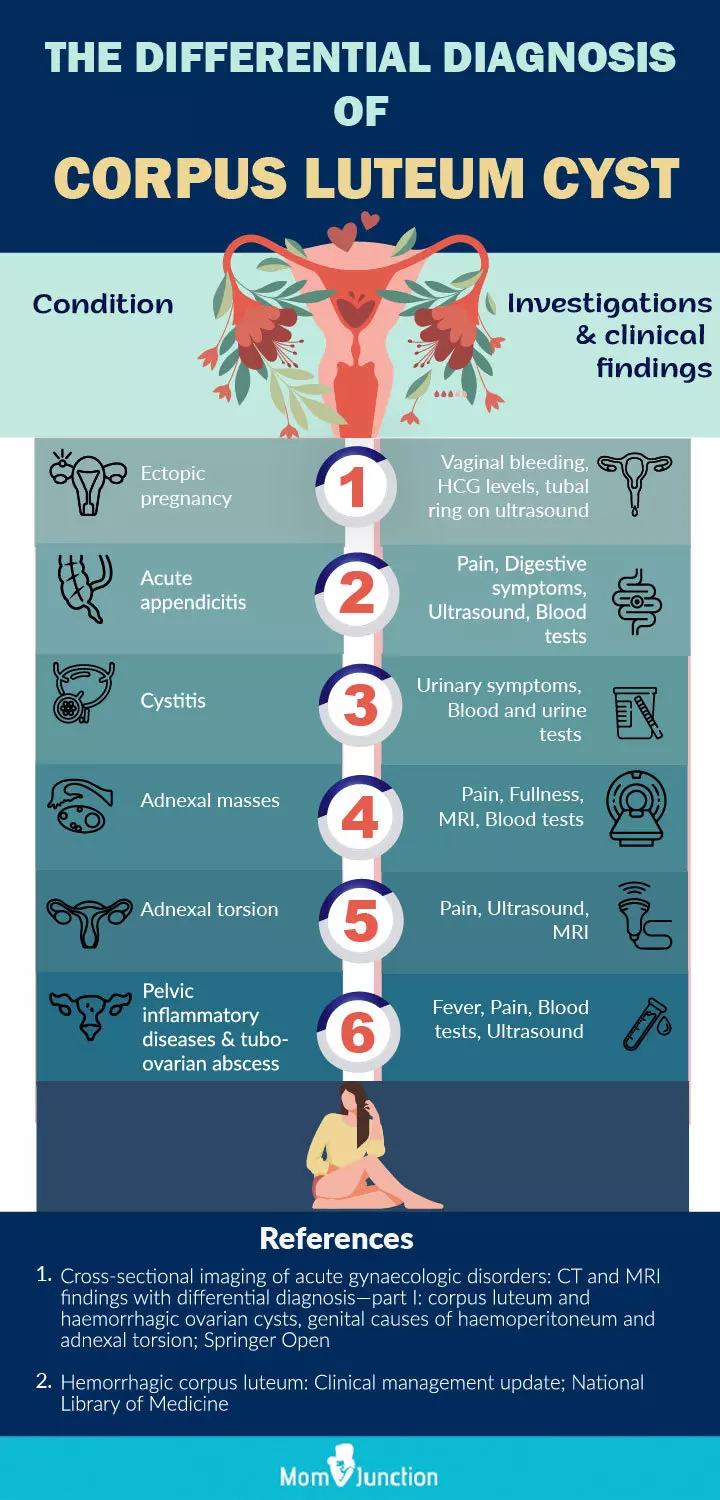
Illustration: Corpus Luteum Cyst In Pregnancy: Symptoms And Treatment

Image: Dall·E/MomJunction Design Team
Learn about the Corpus Luteum Cyst – a fluid-filled sac that can form in a woman’s ovary. Hear the medical definition and pronunciation of this condition.
References
- Corpus luteal cyst.
https://radiopaedia.org/articles/corpus-luteal-cyst - Baerwald A.R. et al.; (2005); Form and function of corpus luteum during human menstrual cycle.
https://www.ncbi.nlm.nih.gov/pmc/articles/PMC2882116/ - Ovarian cysts.
https://womenshealth.gov/a-z-topics/ovarian-cysts - What Risks Are Associated With Ruptured Ovarian Cysts?
https://www.hopkinsmedicine.org/health/conditions-and-diseases/what-risks-are-associated-with-a-ruptured-ovarian-cyst - Ovulation and the phases of the menstrual cycle.
https://www.avogel.co.uk/health/periods/ovulation-and-the-menstrual-cycle/ - The Menstrual Cycle.
https://www.ucsfhealth.org/education/the-menstrual-cycle - Ovarian cysts.
https://medlineplus.gov/ency/article/001504.htm - Ovarian Cysts.
https://www.acog.org/womens-health/faqs/ovarian-cysts - Ovarian Cyst.
https://www.cedars-sinai.org/health-library/diseases-and-conditions/o/ovarian-cyst.html - Corpus luteal cyst rupture.
https://radiopaedia.org/articles/corpus-luteal-cyst-rupture - Kishore Pandit et al.; (2018); Massive Hemoperitoneum from a Ruptured Corpus Luteal Cyst.
https://www.semanticscholar.org/paper/Massive-Hemoperitoneum-from-a-Ruptured-Corpus-Cyst-Pandit/acaa944d531d408b65026d63fc0b6451290df0f2?p2df - Ovarian Torsion.
https://www.yalemedicine.org/conditions/ovarian-torsion - Mykhailo V Medvediev et. al.; (2020); Hemorrhagic corpus luteum cyst: Clinical management update.
https://www.ncbi.nlm.nih.gov/pmc/articles/PMC7731611/ - Ovarian Cysts: What Are the Risks?
https://www.roswellpark.org/cancertalk/201709/ovarian-cysts-what-are-risks - Science Made Simple: Ovarian Cysts and Ovarian Cancer.
https://ocrahope.org/news/science-made-simple-ovarian-cysts-and-ovarian-cancer/ - 7 Reasons Your Pregnancy Test Gave AFalse Positive.
https://www.thesource.org/post/reasons-your-pregnancy-test-gave-a-false-positive - Ovarian Cysts.
https://utswmed.org/conditions-treatments/ovarian-cysts/ - Corpus luteum.
https://radiopaedia.org/articles/corpus-luteum#:~:text=Ultrasound - Robert Lee et al.; (2018); Diagnosing ectopic pregnancy in the emergency setting.
https://www.ncbi.nlm.nih.gov/pmc/articles/PMC5769947/ - Ubong Bassey Akpan et al.; (2021); A twisted giant corpus luteum cyst in the third trimester of pregnancy in a multigravida: A case report.
https://www.researchgate.net/publication/355409817_A_twisted_giant_corpus_luteum_cyst_in_the_third_trimester_of_pregnancy_in_a_multigravida_A_case_report - Corpus Luteum Cyst
https://my.clevelandclinic.org/health/diseases/22340-corpus-luteum-cyst#:~:text=A%20corpus%20luteum%20cyst%20is
Community Experiences
Join the conversation and become a part of our nurturing community! Share your stories, experiences, and insights to connect with fellow parents.
Read full bio of Dr. Richa Hatila Singh
Read full bio of Aneesha Amonz
Read full bio of Rebecca Malachi
Read full bio of Reshmi Das









